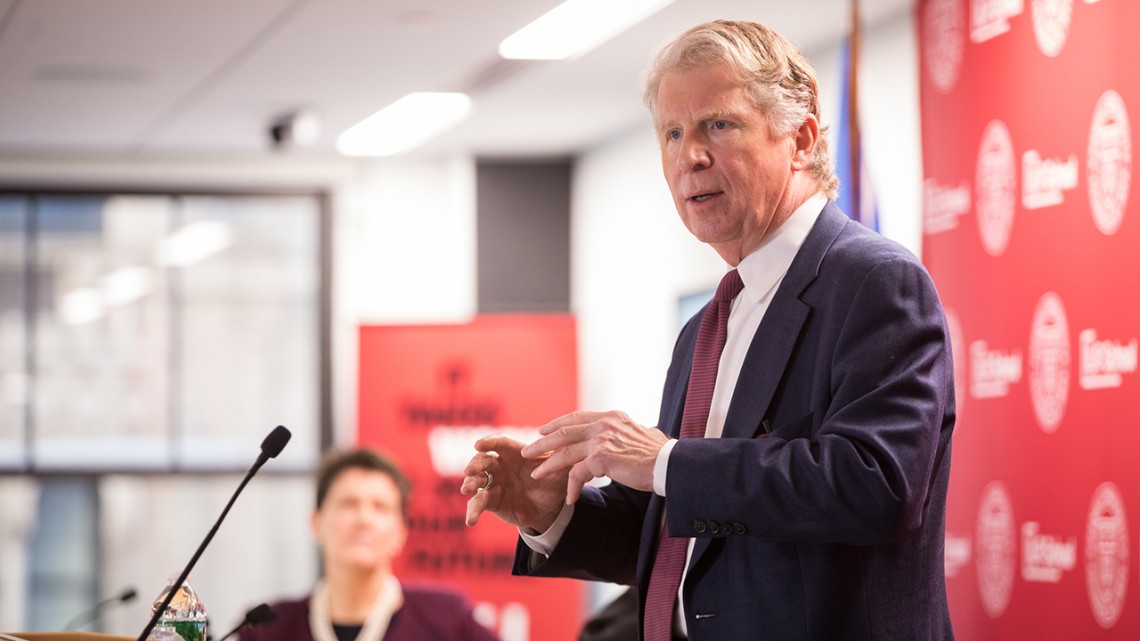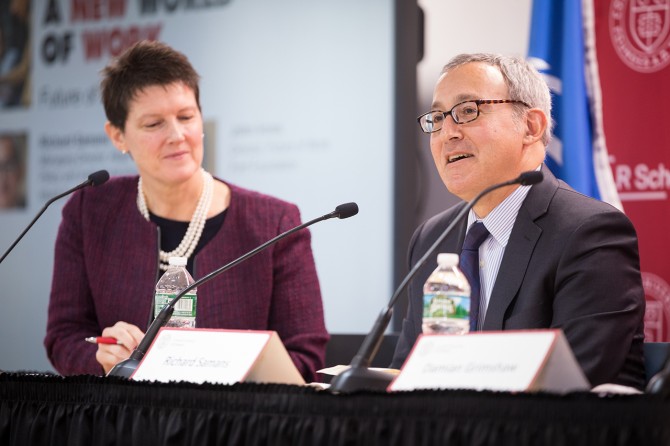
Manhattan District Attorney Cyrus Vance Jr. speaks at ILR's New York City headquarters at 570 Lexington Ave.
Experts: Update the social contract to protect all workers
By Mary Catt
A more human-centered approach to work could create a more equitable world, according to a wide range of experts who gathered at the School of Industrial and Labor Relations’ new Manhattan hub Jan. 31 to discuss the “Work for a Brighter Future” landmark report recently published by the International Labour Organization.
A dramatic shift in the global workplace, where technology is both eliminating and creating jobs, must be met with decisive action by governments, employers and worker organizations in order to create a social contract that includes all workers, even the most vulnerable, the report said.
Work that guarantees economic security and opportunities for all is achievable, but requires collaboration among government, business and education, according to many of the panelists, who addressed around 100 people in ILR’s new New York City headquarters at 570 Lexington Ave.
A human-centered agenda for work’s future, according to the report, would revolve around increasing investment in areas such as lifelong learning, gender equality, the rural economy, living wages, worker safety, collective representation, management of technology for decent work and a social protection system supporting people over the course of their lives.
The launch event continues a decades-long relationship between ILR and the International Labour Organization, which is celebrating its 100th year with the report.
ILR Interim Dean Alex Colvin said the post-World War II social contract between employers and workers has been fundamentally disrupted in the past two decades. But the report offers hope that investment in worker capabilities and the creation of new institutions could advance an agenda of social justice, he said.
Richard Samans, World Economic Forum managing director, said the report embraces an inclusive model of economic growth while offering a practical rendering of what that would look like. The report lays out a framework to upgrade the social contract through improved access to education and other resources.
Placing people at the center of economic policy would be a startling departure from the current model, Samans said. “The world needs a new engine of growth and development. Investing in people can provide it,” he said.
Damian Grimshaw, director of the International Labour Organization Research Department, pointed to the importance of the informal economy, which includes workers such as street vendors, home care workers and Uber drivers, in both developed and undeveloped countries.
Manhattan District Attorney Cyrus Vance Jr. and Manhattan Assistant District Attorney Diana Florence spoke about reckless behavior by construction contractors that dissolves the social contract and results in worker injuries.
Diane Burton, associate professor of human resources in the ILR School and an entrepreneurship scholar, said policymakers should look to cities and states as sources of experimental policies aimed at creating an improved future for work.
Panelists also represented the Ford Foundation, the New York Taxi Workers Alliance, the National Taxi Workers Alliance, Barclays Capital, Global MindED, The World Bank, the AFL-CIO, Fordham University and the National Domestic Workers Alliance.
Mary Catt is assistant director of communications at the ILR School.
Media Contact
Get Cornell news delivered right to your inbox.
Subscribe

